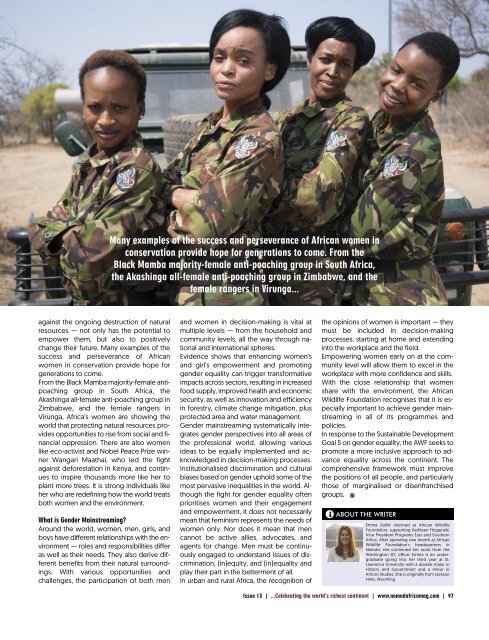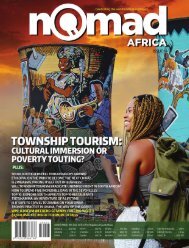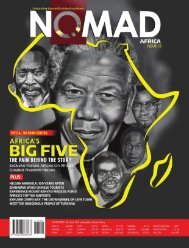Nomad Africa Edition 13
This edition of the magazine presents us with an opportunity to deeply look into faith-based tourism and churches across the continent of Africa. Reports of pastors convincing worshipers to eat snakes, spraying insecticide into mouths of believers during fully packed sermons under the guise of God’s hand apparently, and even buildings that collapse due to poor structural engineering – there has been much strange activity, but no consequence. This makes us ask a single question; should churches not be regulated? (see page 76). Lorraine Masemola – a new addition to our editorial team, attended the Domba traditional dance of magical Venda in South Africa. This colourful python dance, held annually at a very sacred site, Lake Fundudzi, secures good rain for the following season (page 52). In another special feature, Martin Chemhere, in his piece, updates us on South Africa’s newly relaxed visa regulations. Will it significantly help boost tourism in that country? (page 62). To this extent, I will like to say that I am delighted to work with the talented team here at Nomad Africa as I assume the position as the new Managing Editor. It was a daunting idea to build something new in travel journalism - something brave, bold and exceptionally beautiful. Africa’s future is an open road and we’re picking up speed, so it is the perfect time to be joining. Good writing and engaging storytelling are the lenses through which we connect with the world. I look forward to exploring the various cultures, people, developments and trends impacting Africa’s travel and tourism industry. At a time when most online content tends toward the shallow and ephemeral, our stories will seek to deliver sustained engagement and value. As I work with the team to grow the company into a sustainable publisher of smart stories, dynamic insights and carefully curated thought leadership, I hope you find it resourceful and compelling. I am grateful to re-imagine every single page with you. I look forward to the journey. I hope you enjoy the ride with us.
This edition of the magazine presents us with an opportunity to deeply look into faith-based tourism and churches across the continent of Africa. Reports of pastors convincing worshipers to eat snakes, spraying insecticide into mouths of believers during fully packed sermons under the guise of God’s hand apparently, and even buildings that collapse due to poor structural engineering – there has been much strange activity, but no consequence. This makes us ask a single question; should churches not be regulated? (see page 76).
Lorraine Masemola – a new addition to our editorial team, attended the Domba traditional dance of magical Venda in South Africa. This colourful python dance, held annually at a very sacred site, Lake Fundudzi, secures good rain for the following season (page 52). In another special feature, Martin Chemhere, in his piece, updates us on South Africa’s newly relaxed visa regulations. Will it significantly help boost tourism in that country? (page 62).
To this extent, I will like to say that I am delighted to work with the talented team here at Nomad Africa as I assume the position as the new Managing Editor. It was a daunting idea to build something new in travel journalism - something brave, bold and exceptionally beautiful. Africa’s future is an open road and we’re picking up speed, so it is the perfect time to be joining.
Good writing and engaging storytelling are the lenses through which we connect with the world. I look forward to exploring the various cultures, people, developments and trends impacting Africa’s travel and tourism industry. At a time when most online content tends toward the shallow and ephemeral, our stories will seek to deliver sustained engagement and value. As I work with the team to grow the company into a sustainable publisher of smart stories, dynamic insights and carefully curated thought leadership,
I hope you find it resourceful and compelling. I am grateful to re-imagine every
single page with you. I look forward to the journey. I hope you enjoy the ride with us.
Create successful ePaper yourself
Turn your PDF publications into a flip-book with our unique Google optimized e-Paper software.
Many examples of the success and perseverance of <strong>Africa</strong>n women in<br />
conservation provide hope for generations to come. From the<br />
Black Mamba majority-female anti-poaching group in South <strong>Africa</strong>,<br />
the Akashinga all-female anti-poaching group in Zimbabwe, and the<br />
female rangers in Virunga...<br />
against the ongoing destruction of natural<br />
resources — not only has the potential to<br />
empower them, but also to positively<br />
change their future. Many examples of the<br />
success and perseverance of <strong>Africa</strong>n<br />
women in conservation provide hope for<br />
generations to come.<br />
From the Black Mamba majority-female antipoaching<br />
group in South <strong>Africa</strong>, the<br />
Akashinga all-female anti-poaching group in<br />
Zimbabwe, and the female rangers in<br />
Virunga, <strong>Africa</strong>’s women are showing the<br />
world that protecting natural resources provides<br />
opportunities to rise from social and financial<br />
oppression. There are also women<br />
like eco-activist and Nobel Peace Prize winner<br />
Wangari Maathai, who led the fight<br />
against deforestation in Kenya, and continues<br />
to inspire thousands more like her to<br />
plant more trees. It is strong individuals like<br />
her who are redefining how the world treats<br />
both women and the environment.<br />
What is Gender Mainstreaming?<br />
Around the world, women, men, girls, and<br />
boys have different relationships with the environment<br />
— roles and responsibilities differ<br />
as well as their needs. They also derive different<br />
benefits from their natural surroundings.<br />
With various opportunities and<br />
challenges, the participation of both men<br />
and women in decision-making is vital at<br />
multiple levels — from the household and<br />
community levels, all the way through national<br />
and international spheres.<br />
Evidence shows that enhancing women’s<br />
and girl’s empowerment and promoting<br />
gender equality can trigger transformative<br />
impacts across sectors, resulting in increased<br />
food supply, improved health and economic<br />
security, as well as innovation and efficiency<br />
in forestry, climate change mitigation, plus<br />
protected area and water management.<br />
Gender mainstreaming systematically integrates<br />
gender perspectives into all areas of<br />
the professional world, allowing various<br />
ideas to be equally implemented and acknowledged<br />
in decision-making processes.<br />
Institutionalised discrimination and cultural<br />
biases based on gender uphold some of the<br />
most pervasive inequalities in the world. Although<br />
the fight for gender equality often<br />
prioritises women and their engagement<br />
and empowerment, it does not necessarily<br />
mean that feminism represents the needs of<br />
women only. Nor does it mean that men<br />
cannot be active allies, advocates, and<br />
agents for change. Men must be continuously<br />
engaged to understand issues of discrimination,<br />
(in)equity, and (in)equality and<br />
play their part in the betterment of all.<br />
In urban and rural <strong>Africa</strong>, the recognition of<br />
the opinions of women is important — they<br />
must be included in decision-making<br />
processes, starting at home and extending<br />
into the workplace and the field.<br />
Empowering women early on at the community<br />
level will allow them to excel in the<br />
workplace with more confidence and skills.<br />
With the close relationship that women<br />
share with the environment, the <strong>Africa</strong>n<br />
Wildlife Foundation recognises that it is especially<br />
important to achieve gender mainstreaming<br />
in all of its programmes and<br />
policies.<br />
In response to the Sustainable Development<br />
Goal 5 on gender equality, the AWF seeks to<br />
promote a more inclusive approach to advance<br />
equality across the continent. The<br />
comprehensive framework must improve<br />
the positions of all people, and particularly<br />
those of marginalised or disenfranchised<br />
groups.<br />
i<br />
ABOUT THE WRITER<br />
Emma Sollitt interned at <strong>Africa</strong>n Wildlife<br />
Foundation, supporting Kathleen Fitzgerald,<br />
Vice President Programs East and Southern<br />
<strong>Africa</strong>. After spending one month at <strong>Africa</strong>n<br />
Wildlife Foundation's headquarters in<br />
Nairobi, she continued her work from the<br />
Washington DC office. Emma is an undergraduate<br />
going into her third year at St.<br />
Lawrence University with a double major in<br />
History and Government and a minor in<br />
<strong>Africa</strong>n Studies. She is originally from Jackson<br />
Hole, Wyoming.<br />
Issue <strong>13</strong> | ...Celebrating the world’s richest continent | www.nomadafricamag.com | 97





